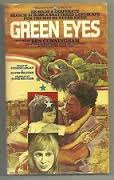
GREEN EYES
US, 1977, 100 minutes, Colour.
Paul Winfield, Rita Tushingham.
Directed by John Erman.
Green Eyes is an impressive and effective telemovie full of strength and sentiment. It is a story of the aftermath of the Vietnam war and highlights American responsibility to the Vietnamese. Filmed convincingly in Manila, it re-creates the atmosphere of suffering in the area and the dangers of callous neglect after it. Paul Winfield gives an excellent performance and is paired with English Rita Tushingham in an offbeat role.
Direction is by John Erman, a television director who also directed the remake of Somerset Maugham's The Letter with Lee Remick and Jack Thompson. This telemovie can be compared with My Husband Is Missing, with Sally Struthers, where she goes to find her missing husband in North Vietnam. These are human statements which can be seen in the light of The Deer Hunter and Apocalypse Now as well as the group of 30 or so movies highlighting the Vietnam war.
1. The impact of the films on Vietnam throughout the '70s? The war as background to dramas? Americans and their attitude towards the involvement? The experience of war? The late '70s and the critique of the involvement? Suffering? The impact of the withdrawal of the troops? The fall of Saigon? The danger of Americans forgetting? The film and its appeal to conscience?
2. Its impact as telemovie? Strength of the plot, audience involvement, geared to the home audience?
3. The film's attitude towards the war itself? Background to the war? American involvement? The lack of awareness of the Vietnamese and their traditions? The battle scenes with the American troops and their ignorance? The relationships between the troops and the local women? The number of children born, orphaned? The orphanages and trying to cope after the withdrawal? The responsibility of the American fathers and their families?
4. The film's highlighting the plight of the Vietnamese, begging and scrounging for a living, the taxi driver and his attitudes and advice.. the children roaming the streets and hustling? The film's focus on Trung and his cheeky hustling? The babies and small children in the orphanages? The women and their liaisons, prostitution? The contrast of the hero with Noel and his disappearing and hustling? The contrast with life and affluence at the embassies? The social needs, help, do-goodism?
5. The hero's return from the war? The official announcements and pride of the returning troops? His friendship with Noel and visiting his family? The irony of what really happened to Noel and the pathos of his parents grieving? The return home, resumption of family life, the mother with her money and its being used for the search in Vietnam? Interviews for jobs and their not being available? The film's comment on society's attitudes towards the returning veterans?
6. The highlighting of black families and their reaction to the war and the returning veterans?
7. The dramatic impact of the search? The arrival in Saigon, the taxi driver, the interviews with the women, Trung and his robbing, Margaret and her tour of the orphanages and highlighting the poverty and death?
8. Trung and his leads, the contact with Noel, the money to search for the woman and her child, the eventual discovery - and the news of the death of the baby? Trung as an image of the dead child? The second child who was alive?
9. Margaret and her work, the importance of the party sequence with the healthy and wealthy guests, throwing the food to the starving children? The hero and his help, his staying and giving his services for the Vietnamese - atonement?
10. His returning home, sense of responsibility, Trung and his becoming the child with green eyes?
11. The universal message about war, individuals, exploitation, conscience, responsibility? Impact for American audiences with direct experience of the war? For wider audiences?